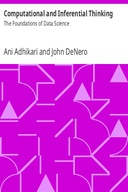Explore

Computational and Inferential Thinking: The Foundations of Data Science
Data Science is about drawing useful conclusions from large and diverse data sets through exploration, prediction, and inference. Exploration involves identifying patterns in information. Prediction involves using information we know to make informed guesses about values we wish we knew. Inference involves quantifying our degree of certainty: will those patterns we found also appear in new observations? How accurate are our predictions? Our primary tools for exploration are visualizations and descriptive statistics, for prediction are machine learning and optimization, and for inference are statistical tests and models.
Statistics is a central component of data science because statistics studies how to make robust conclusions with incomplete information. Computing is a central component because programming allows us to apply analysis techniques to the large and diverse data sets that arise in real-world applications: not just numbers, but text, images, videos, and sensor readings. Data science is all of these things, but it more than the sum of its parts because of the applications. Through understanding a particular domain, data scientists learn to ask appropriate questions about their data and correctly interpret the answers provided by our inferential and computational tools.
This is the textbook for the Foundations of Data Science class at UC Berkeley. Read online at the book's website.
Why read this book? Have your say.
You must be logged in to comment.
Rights Information
Are you the author or publisher of this work? If so, you can claim it as yours by registering as an Unglue.it rights holder.Downloads
- 2249 - pdf (CC BY-NC) at Unglue.it.
Keywords
- Computers
- Computers / Data Processing
- Data mining
- Statistics
Links
web: https://www.gitbook.com/book/ds8/textbook/detailsEditions


What a great book about data science!